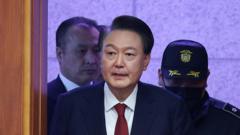The historical political fabric of South Korea has been severely tested as former President Yoon Suk Yeol faces charges of insurrection stemming from his controversial attempt to declare martial law last December. This act, deemed an effort to establish military rule, pushed the nation into a significant political crisis, marking Yoon as the first sitting president in South Korean history to face criminal charges.
The recent indictment came after a Seoul court denied Yoon's request for extended detention, compelling prosecutors to decide on his charges promptly. A spokesman for the opposition Democratic Party, Han Min-soo, expressed a sense of vindication, proclaiming that the accountability for Yoon's actions had finally begun. The Constitutional Court is currently examining whether to officially remove Yoon from the presidency or consider reinstating him after his impeachment.
The beleaguered leader's refusal to cooperate with investigations into his martial law declaration further complicates the case. Yoon is set to be tried alongside his former defense minister and other high-ranking military officials implicated in the failed attempt to seize power. During a nationally televised address on December 3, Yoon declared martial law, claiming it was necessary to combat what he termed "anti-state" elements perceived to resonate with North Korea. This declaration coincided with his battles over budget legislation and various corruption scandals affecting several ministers within his administration.
In the fallout from his declaration, the military suspended legislative functions, inducing uproar among lawmakers and citizens. Just hours after Yoon’s announcement, parliamentary members, including those from his own party, convened and unanimously voted against the martial law, effectively blocking Yoon's intentions. The scene escalated dramatically as armed soldiers were reported breaking into the parliament amidst protests, allowing civilians to converge and confront military actions.
Yoon's impeachment by parliament on December 14 triggered nationwide protests, with many supporting him amidst calls for his return to office. Should the Constitutional Court decide to confirm his removal, provisions dictate that a presidential election would occur within 60 days, potentially leading to further political upheaval for the nation. The prosecutors’ office has not provided additional comments as the situation evolves, with the nation closely monitoring these developments.
The recent indictment came after a Seoul court denied Yoon's request for extended detention, compelling prosecutors to decide on his charges promptly. A spokesman for the opposition Democratic Party, Han Min-soo, expressed a sense of vindication, proclaiming that the accountability for Yoon's actions had finally begun. The Constitutional Court is currently examining whether to officially remove Yoon from the presidency or consider reinstating him after his impeachment.
The beleaguered leader's refusal to cooperate with investigations into his martial law declaration further complicates the case. Yoon is set to be tried alongside his former defense minister and other high-ranking military officials implicated in the failed attempt to seize power. During a nationally televised address on December 3, Yoon declared martial law, claiming it was necessary to combat what he termed "anti-state" elements perceived to resonate with North Korea. This declaration coincided with his battles over budget legislation and various corruption scandals affecting several ministers within his administration.
In the fallout from his declaration, the military suspended legislative functions, inducing uproar among lawmakers and citizens. Just hours after Yoon’s announcement, parliamentary members, including those from his own party, convened and unanimously voted against the martial law, effectively blocking Yoon's intentions. The scene escalated dramatically as armed soldiers were reported breaking into the parliament amidst protests, allowing civilians to converge and confront military actions.
Yoon's impeachment by parliament on December 14 triggered nationwide protests, with many supporting him amidst calls for his return to office. Should the Constitutional Court decide to confirm his removal, provisions dictate that a presidential election would occur within 60 days, potentially leading to further political upheaval for the nation. The prosecutors’ office has not provided additional comments as the situation evolves, with the nation closely monitoring these developments.

















